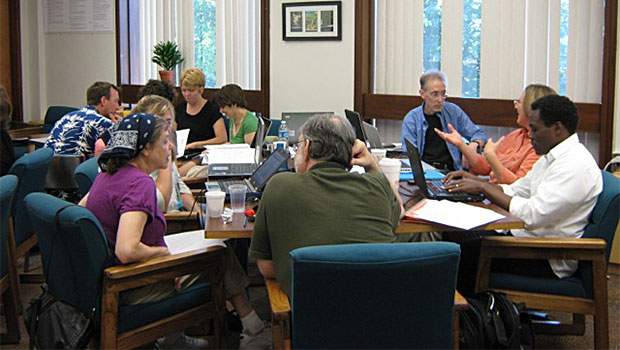Looking for a new way to foster discussion in your classroom? Try this sticky note exercise! This highly adaptable exercise allows for meaningful discussion, while the anonymity of it allows students the freedom to express their ideas. Try using this method to discuss writing in your classroom, and see what new revelations your students come to.
Tag: writing education
Wikipedia: What Professors Tell Students and What Students Do
- Post author By caitlincholmes
- Post date February 12, 2015
by: Mikal Cardine
Mikal is a senior studying English at George Mason. She previously worked with WAC to create disciplinary writing guides for student use. To reach her, please contact wac@gmu.edu.
The average undergraduate will hear a variety of conflicting viewpoints from their university professors on the topic of Wikipedia. While some professors will openly express distrust of Wikipedia as a source for research, others are more open to the use of Wikipedia as a learning tool. While Middlebury College outright banned undergraduates from citing Wikipedia in any academic essay—stating that “students need to be taught to go for quality information, not just convenience” (Jaschik, 2)—professors such as Mark Kissling argue that faculty do a disservice to their students if they don’t help them to understand why instructors are concerned about the source. As Kissling writes, professors have a duty to teach “their students to learn to critically read Wikipedia…helping them understand how it is created, how it defines and positions knowledge, and what it makes possible and fails to do” (Kissling, 1).
As an undergraduate, I have to admit that Wikipedia is in. Originally branded as untrustworthy, the site is now our go-to research tool – but why? Has student scholarship fallen so far? Or has Wikipedia possibly become a useful research tool? Prompted to learn more, I decided to do a little research and created a simple survey to determine Wikipedia’s current value to both professors and students.
- Tags College Composition, composition, digital media, digital writing, education, Higher Ed, higher education, Mason WAC, Online writing, pedagogy, research, Teaching, Teaching Strategies, WAC, WID, Wikipedia, Writing, Writing Across the Curriculum, writing education, Writing in the Disciplines, writing pedagogy, Writing-Intensive
New Series: Supporting Faculty Writers – “The Weekend Retreat”
- Post author By caitlincholmes
- Post date January 22, 2015
Erica Jacobs teaches English at Oakton High School and writing at George Mason University. She had a B.A., M.A., and Ph.D. from Columbia University and has published numerous articles in local newspapers, newsletters, and magazines. This article is a reprint from her 1997 publication, “The Weekend Retreat.” Be on the look-out for her follow-up piece this February on her most recent participation in the WAC-sponsored Winter Faculty Writing Retreat that took place on January 7-8, 2015.
As a non-tenure track teacher at George Mason University, I was pleased to discover I was eligible to participate in a “Writing Retreat” sponsored by the English department and the Northern Virginia Writing Project in the fall of 1978. Don Gallehr had completed the first two summers of the Writing Institute with local high school teachers, and their success on the secondary level seemed to promise equal success on the University level.
VIDEO: Principles for Assignment Design
- Post author By caitlincholmes
- Post date December 5, 2014
Mason WAC’s learning module on best practices for writing assignment design in any discipline!
Elaborated Assignment
Unelaborated Assignment
Assignment Design Principles
- Tags Assignment Design, composition, Design, education, Feedback, Grading, Higher Ed, higher education, Learning Modules, pedagogy, Revision, Teaching, Teaching Strategies, The Writing Campus, WAC, WID, Writing, Writing Across the Curriculum, writing education, Writing in the Disciplines, writing pedagogy, Writing-Intensive
Read-Around Groups: Low-Stakes and High-Impact Writing in First-Year Composition
- Post author By caitlincholmes
- Post date November 13, 2014
By Caitlin Holmes
Since Dr. José Bowen visited Mason in September 2014, I have been working to implement more of his suggestions for teaching practice into my class. I wrote previously about utilizing one such suggestion: a combination of reading, writing in response, and discussion to understand the rhetorical nature of APA style. More recently, I have experimented with another approach to improving student writing in a low-stakes environment that requires students to show the higher-order thinking skills that Dr. Bowen emphasized: read-around groups. During his workshop at Mason, Bowen reminded us that students respond well to uncertainty, failure, and experimentation, and read-around groups (or RAGs, as they are also known) certainly allow for those conditions to emerge in a productive way.



